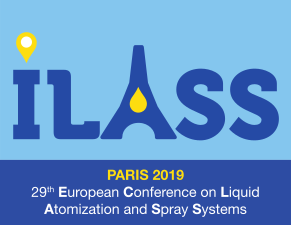The present work was realized in order to understand the influence of the boundary conditions on the atomization process in an atmospheric continuous-flow burner, which consists of an annular non-swirling co-flow of air that surrounds a central cone spray atomized by a commercial simplex injector. A new Microscopic Diffused Back Illumination (MDBI) technique was used to analyze droplet diameter and droplet velocity near to the injector outlet. The spray distribution yields small droplets along the spray-axis while the majority of the mass is situated as big droplets along the spray borders. Furthermore, a new test rig was designed to analyze the atomization and combustion phenomena in this sort of burners under different ambient conditions and geometrical setups, this facility is capable of reaching an air flow of 400 kg/h and air temperatures up to 673 K (depending on the air mass flow). The test matrix implemented consisted of a variation of injection pressure at fixed air surrounding conditions (mass flow and temperature) and an air outlet diameter of 21 mm, the experiments were carried out with n-heptane, n-dodecane, and n-hexadecane, physical properties of the fluid demonstrated to have a noteworthy influence on the global spray performance as well on the droplet velocity and droplet size near the nozzle exit.
|
|
|
|
Experimental study of the influence of the boundary conditions on the atomization process in an unconfined atmospheric burner
1 : Universitat Politecnica de Valencia
* : Corresponding author
Camino de Vera, s/n46022 Valencia -
Spain
|
| Online user: 53 | RSS Feed |

|


